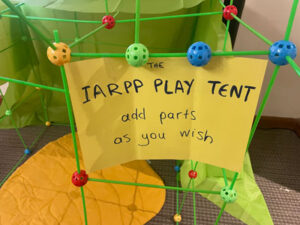Mérida Conference
Each year The IARPP Bulletin features a compilation of conference reflections contributed by a cross-section of IARPP members. It’s my hope that this mosaic of impressions will give those of you who did not make it to Mérida a sense of the experience from multiple perspectives, and those who did attend will have an opportunity to recall their own experiences as well as to see the conference through a range of different lenses. I thank all the contributors for taking the time to share their thoughts with us. – MA
[Scroll down, or click on name to go to specific piece.]
Adriana Cuenca & Berta Loret de Mola
Stephen Gee
Marilou Kountria & Aikaterini Karagianna
Diego Lopez
Peter McKay
Laura Molet Estaper
Shir Shanun
Minh Truong-George
Adriana Cuenca
San Diego, California, USA/Tijuana, Mexico
Berta Loret de Mola
Mérida, Mexico
Conference Co-Chairs
It has been an honor for us to organize the twentieth IARPP Conference, “The Quest for Belonging and the Co-Creation of a Therapeutic Home,” in Mérida, Yucatán, México in June. The event marked a milestone for our local community, bringing together distinguished professionals and academics from various parts of the world.
We had great participation with high-quality academic work, with in-person attendance representing 19 countries. We explored the concept of home from numerous perspectives, opening a range of deep reflections and debates. We addressed topics such as home in times of war, memories as the home of our childhood, home as a place of danger and as a space of creativity. We discussed the non-home of refugees, the search for a better home among migrants, and the relationship with planet Earth as the home of humanity, all enriching our understanding of this fundamental concept.
The event was filled with warmth, reflecting the enthusiasm and dedication of the psychotherapy students from Yucatán, whose participation was particularly outstanding and enthusiastic. This youthful energy, combined with the experience of the professionals present, created a unique and stimulating environment.
We express our deepest gratitude to all the attendees for making this conference a wonderful experience. Your enthusiasm, support, and commitment were essential to the success of the event. The conference gave us not only knowledge but also the memory of a vibrant and committed community. Thank you all for your participation, and we look forward to seeing you at the next conference!
Adriana Cuenca and Berta Loret de Mola
IARPP Conference 2024 Co-Chairs
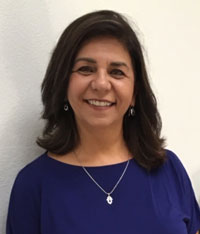
Adriana Cuenca
San Diego, California, USA/Tijuana, Mexico
Email Adriana Cuenca
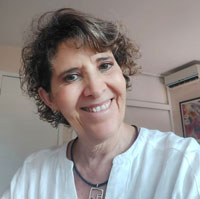
Berta Loret de Mola
Mérida, Mexico
Email Berta Loret de Mola
Stephen Gee
London, England
How would I survive? I’d arrived in Mexico after a 10-hour flight from London to Cancun and then a 4-hour bus journey to Mérida. No problem, it turned out. The joy of meeting the friends I had made since the Chile conference in 2013 blew away my jet lag. I had booked the conference trip to a cenote where 40 or so of us donned life jackets and swam in one of the wonders of this watery world just below the surface of the Yucatan Peninsula. The next day we were off again to the ancient city of Uxmal, abandoned when persistent drought tried the Maya people’s faith in their Rain God Chaac and made living there untenable. They had their share of environmental crises and conflict back then, well before the catastrophe of Spanish invasion and colonisation.
In the 1920s and 30s, psychoanalyst and communist Wilhelm Reich treated people who, in his phrase, were ‘in trouble.’ His diagnosis of the trouble was both political and psychical: poverty, unemployment, and the rise of fascism, all of a piece with the ills of sexual repression. Now, with the climate crisis, wars in Europe and the Middle East, and the global rise of the far right, we’re all in trouble.
This was the context for the recent IARPP conference.
I had attended four IARPP conferences previously, and I decided that this time I wanted to present a paper and work out my thinking about where I am in my life and analytic work. I had turned to psychoanalysis during the HIV pandemic, troubled and overwhelmed. Looking back, the big question for me then was, Where and what was home to me in the midst of so much loss?
In his plenary paper, Anthony Bass (USA) drew attention to the sentence, “I am home.” In the first sense, it is an announcement: I have returned. In the second sense: I am my own dwelling place, and flowing from that, I am someone who can invite people in. It sums up the ongoing hope of my experience of psychoanalytic work both as a patient and as a therapist. Psychoanalysis in its relational turn creates a ‘scene of address.’ Every home can be reached if it has an address. In both senses of that word: a home address where what is familiar and strange can be heard, where enigmatic messages can arrive and be translated (Laplanche; Butler, 2005).
There were some extraordinary presentations in Mérida. The level of clinical inquiry revealed the hard work that therapists from all over the world had put in, and I learned a lot from them. In writing my paper I discovered for myself the intricate dynamic of self/other, past and present. I was creating my own scene of address to friends and colleagues in this temporary conference home.
Our family homes are both the scene of our first most intimate relationships and also the theatre of trauma and breakdown. Though in many ways I had tried to leave it all behind, there was always the trace of call from my childhood home. Never forget where you come from! The call of My Mother? My friend Frances Dillon (USA) presented a beautiful paper in Mérida, an account of her research into her mother’s singing career. She discovers some footage in the film archive in Los Angeles and hears, as if for the first time, a note in her mother’s voice of love and longing. Across time and space I try and discern the tone of the call of my own mother. She was born in the 1920s. English, working class. She left school when she was 14 years old. There was some reproach in my mother’s call to me to not forget my origins. I had moved away. My education and my sexuality initially made me a stranger. Lately I hear her call as an appeal to me to keep faith with that first home.
The cenotes beneath the surface of the land were a vital part of the ecosystem of Mayan civilisation. Lacan speaks of the installation of the paternal metaphor as a necessary moment: it stops us drowning in the world of the mother and going mad. At all costs, separate. A psychoanalytic home empowers a return to what unfolds as maternal metaphor: a place with a language in which we can learn to address the trouble we are in, and a place to listen for a voice that reminds us, when all said and done, that we still belong.
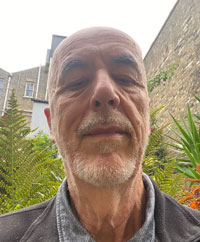
Stephen Gee, BA
London, England
Email Stephen Gee
Marilou Kountria & Kate Karagianni
Athens & Piraeus, Greece
Kate: Attending the 2024 IARPP Conference was an enriching experience on many levels. We got to see in-person colleagues from all over the world, reuniting with people we knew and meeting new ones who share the same passion for relational ideas. We enjoyed all the different papers, like the one by Francesco Andreucci (Italy), which demonstrated how we work with the reflections, representations, dreams, and enactments in the intersubjective field so as to co-create therapeutic homes with our clients. We had the opportunity to share our work with children and adolescents and exchange fruitful ideas about clinical practice with attendees from different countries. We visited historic monuments and experienced the traditions of the combination of the Mayan and Spanish cultures. We danced by the beach, tasted amazing sopas de lima and drank refreshing margaritas!
Marilou: I share the same excitement! I believe the IARPP Conference reminded us, once again, how important the community is in our field, as sharing our experiences and insights can lead to new approaches and a deeper understanding of relational psychoanalysis. I appreciated the opportunity to attend the discussion groups as well as the large groups led by Haim Weinberg (USA) and Stavros Charalambides (Greece), which helped me reflect upon the different relational concepts and enhanced a sense of belonging. The conference theme left me thinking how a professional association can also act as a therapeutic home for clinicians.
Kate: One thing is for sure, this year’s conference theme resonated deeply with our work both in the art therapy room and the play therapy room. We almost immediately agreed that we wanted to create a panel demonstrating how we use the therapy space and a variety of materials, both literally and metaphorically, in our therapeutic work to co-create a safe place as an antidote to deprived environments that many young clients have experienced. We wrote two complementary papers for our panel entitled “Relational Psychoanalytic Psychotherapy with Children and Adolescents: The Use of the Play Tent as a Therapeutic Home.” Marilou presented the work with a five-year-old boy, who through a persistent game of hide-and-seek in the tipi tent with the therapist managed to feel acknowledged and empowered. Marilou viewed the tipi tent as a nurturing womb-like environment that supported them to co-create a secure base for their therapeutic journey. I explored the transformative potential of the play tents co-created by young clients and their therapist using plastic straws. I also demonstrated how the play tents made during individual sessions that remained in the therapy room created a powerful dialogue among individual clients and ultimately led to the co-creation of installations during school lockdowns and times of national grief in the quest of a safe home and belonging.
Marilou: Additionally, we wanted our colleagues to have a clear picture of what it feels like to be in the therapy room with a child or an adolescent. So we brought some of our materials and started a play tent right in the conference room. We invited the audience to add parts as they wished, so they could connect with our work on a deeper level. Many welcomed this experiential setup and stood up from their chairs to interact with each other and contribute to the creation of an IARPP play tent!
Kate: This year’s conference left us inspired and committed to continue exploring creative and relational approaches in our clinical practice with children and adolescents. As Matt Aibel (USA) playfully closed his commentary in our panel with a “Pokémon” TV show reference, “The journey continues” in the vibrant and evolving field of relational psychoanalysis!
Marilou: From the paradox of home, as Robert Grossmark (USA) mentioned in a plenary, we look forward to seeing you in Greece to explore the paradox of freedom in relational psychoanalysis at the 2025 IARPP Conference!
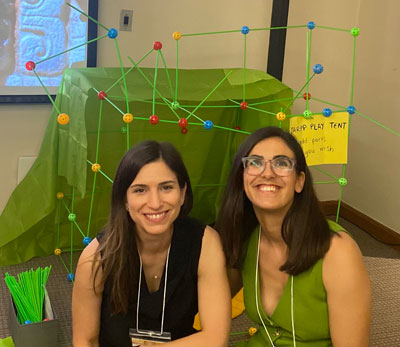
Marilou Kountria, MSc
Athens, Greece
Email Marilou Kountria
Kate Karagianni, MA
Athens, Greece
Email Kate Karagianni
Diego López
Yucatán, México
This was the first time I participated in an IARPP conference, and it was an immensely happy experience.
Since a year ago, when I learned that this international meeting would be held in my country and in my city, I was inspired to participate. My surprise was that my participation was not only as an attendee but also as an interlocutor, in a language different from mine. It was a great challenge and learning experience that I hope to repeat.
I never imagined the close, warm, supportive, and friendly atmosphere that characterized the four days of activities, where I had the opportunity to listen to and meet in person some of the authors I had read as a student, who inspire my clinical practice, such as Sandra Buechler (USA). It was like meeting a famous singer or actress! I approached her, greeted her, shared a brief conversation and asked for a photo. In addition, today I have new friends from different parts of the world thanks to this conference.
The plenary sessions and papers offered sensitive writings where each analyst shared his or her fears, anxieties, and uncertainties in the arduous task of accompanying patients with deeply human interventions and moving stories, sharing encounters of deep intimacy where both patient and analyst are transformed. The presentations included political, social, historical, cultural, and intersubjective dimensions which constitute us all and make up the script of our own histories.
It was shocking and moving to listen to those presenting stories about the war in the Middle Eastern. We cannot be oblivious to an event of such magnitude that has left deep wounds on individual and collective levels. Likewise, the impact that globalization has on nature and the planet is alarming. Whether through war or globalization, our home is at risk. What can we psychoanalysts do about it? I am sure there is no single answer. The answer will be built among all of us and in community. However, perhaps one way to start is not to be indifferent to what is happening in front of our eyes regardless of the country we come from.
The quest for belonging and the co-creation of a therapeutic home involves integrating all the dimensions that constitute us as human beings. It involves the presence and disposition of another who welcomes you with all that accompanies you. As a community we need these spaces to listen and reflect on our clinical work – especially when theory does not always have the answers we need to the big questions we ask ourselves in front of our patients. Those of us who dedicate ourselves to psychotherapy or psychoanalysis have a very solitary job. We disconnect for hours from external reality to immerse ourselves in patients’ internal reality and in our own reality as well, and we do it alone. If we are lucky, after a day of hard work we might soon have our psychotherapy, analysis or supervision session to talk to an other who welcomes us with all that we bring. Otherwise, it is possible that a patient’s session does not end 45 minutes after it has started, but may last for several days in our mind, and we may keep inside for a long time the anguish and pain that arise from our encounters with them. For this reason I think this conference serves as an oasis in the middle of the desert of the unthought, as Ferro would say. What a relief to feel identified with what colleagues share, with reflections that are born after hearing each story, bearing its particular ways of thinking, doing, and living psychotherapy. What a pleasure to belong to a great family and home called psychoanalysis.
Thank you very much, Berta and Adriana and all the IARPP Board of Directors, for making this event possible. I hope to see you again next year in Athens.
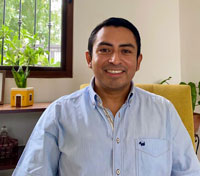
Diego López, MPP
Mérida, Yucatán, México
Email Diego López
Diego López
Yucatán, México
Es la primera vez que participo en un Congreso de la IARPP. ¡Estoy inmensamente feliz!
Desde hace un año, al enterarme que este congreso internacional se llevaría a cabo en mi país y en mi ciudad me inspiró para participar. Mi sorpresa fue que mi participación no solo fue como público en general sino como interlocutor en una sesión de trabajo con otros colegas psicoanalistas de gran trayectoria y en un idioma diferente al mío. Fue un gran reto y un gran aprendizaje que estoy dispuesto a volver a experimentar.
Nunca imaginé el ambiente tan cercano, cálido, solidario y amistoso que caracterizó los cuatro días de actividades donde tuve la oportunidad de escuchar y conocer en persona a algunos de los autores de los libros que leí cuando era estudiante y que hoy inspiran mi práctica clínica como Sandra Buechler (EU). ¡Fue como conocer a un cantante o una actriz famosa! Acercarme, saludarlo, compartir una breve plática y pedirle una foto. Además hoy tengo nuevos amigos de diferentes partes del mundo gracias a este Congreso.
Las plenarias y trabajos presentados se caracterizaron por ser escritos sensibles donde cada analista compartió su sentir, sus miedos, sus angustias y sus incertidumbres ante la ardua labor de acompañar a los pacientes en sus procesos de análisis con intervenciones profundamente humanas y relatos conmovedores que muestran un encuentro de profunda intimidad en donde paciente y analista se transforman. Asimismo, las presentaciones incluyeron el abordaje de las dimensiones políticas, sociales, históricas, culturales, intersubjetivas que nos constituyen a todos y que conforman el guion de nuestra propia historia.
Fue impactante y conmovedor escuchar a quienes presentaron relatos sobre la guerra que está ocurriendo en países del medio oriente. No podemos ser ajenos a un evento de tal magnitud que ha dejado profundas heridas a nivel individual y colectivo. Asimismo, el impacto que la globalización tiene en la naturaleza y en el planeta es alarmante. Ya sea a través de la guerra o a través de la globalización, nuestro hogar está en riesgo. ¿Qué podemos hacer los psicoanalistas al respecto? Esa es una pregunta que surge en mí a partir de las experiencias compartidas en este congreso. Estoy seguro que no existe una única respuesta. La respuesta se irá construyendo entre todos y en comunidad, sin embargo, quizá una manera de empezar es no siendo indiferente ante lo que ocurre frente a nuestros ojos independientemente del país de donde vengamos.
La búsqueda de la pertenencia y la co-creación de un hogar terapéutico implica integrar todas las dimensiones que nos constituyen como seres humanos. Involucra la presencia y disposición de otro que te de la bienvenida con todo lo que te acompaña. Como comunidad necesitamos estos espacios para escucharnos, pensarnos y reflexionar en nuestro quehacer clínico. En especial cuando la teoría no siempre tiene las respuestas que necesitamos ante las grandes preguntas que nos hacemos frente a los pacientes. Surge mucho en la intimidad de nuestros consultorios. Quienes nos dedicamos a la psicoterapia o al psicoanálisis tenemos un trabajo muy solitario. Nos desconectamos horas de la realidad externa para sumergirnos en la realidad interna de los pacientes y en la nuestra también y lo hacemos solos. Si tenemos suerte, quizá después de un día de arduo trabajo, tengamos próximamente nuestra sesión de psicoterapia, de análisis o de supervisión para hablar con un otro que nos recibe con todo lo que traemos. De lo contrario, es posible que la sesión de un paciente no finalice a los 45 minutos de haber iniciado, sino que pueda prolongarse varios días posteriores en nuestra mente y alojamos en nuestro interior por mucho tiempo las angustias y el dolor que surge de la historia y del encuentro con ellos. Por ese motivo pienso que este Congreso donde escuchamos la presentación de trabajos clínicos, sirve como un oasis en medio del desierto de lo no pensado como diría el psicoanalista Antonino Ferro. ¡Qué alivio sentirnos identificados con lo que comparten los colegas!, con las reflexiones que nacen después de escuchar cada relato que lleva un sello particular de la forma de pensar, hacer y vivir la psicoterapia. Qué grato es pertenecer a una gran familia y un hogar llamado psicoanálisis.
Muchas gracias Berta y Adriana y todo el comité directivo de la IARPP por hacer posible este evento. Deseo que nos volvamos a ver de nuevo en Athenas, Grecia.

Diego López, MPP
Mérida, Yucatán, México
Email Diego López
Peter McKay
Melbourne, Australia
Oh, so many reflections on the most recent IARPP Conference in Mérida!
Arriving on the first day I was filled with anticipation as many possibilities entered my body – catching up with old friends, meeting new friends, hearing amazing presentations, and just being amongst a group of like-minded individuals from all over the world.
The theme of the conference included the notion of home and belonging, and I certainly felt welcomed and safe in my temporary home for my stay in Mérida. The warm people, the beauty of the land, and the history present in the architecture all added to my sense of awe and belonging. Not to mention, the experience of enjoying so much delicious food!
The plenaries were not only enjoyable and fascinating but also educational. The first one, titled Mayan ‘Home’: Spirituality, Community, and Identity, provided a grounded context to where we were situated during the conference and the history of the area and the people of these lands. This really allowed a stable base from which to undertake an embodied experience of all that the conference had to offer.
The remaining plenaries continued to educate and inspire, and as always it was difficult to choose which panels to attend. Of the panels I attended I really felt a part of something special, hearing people’s experiences of working and helping their clients/patients find a sense of belonging in the world. From hearing about working with children creatively to nurture their experience of fitting in, to the therapist’s personal identification, the impact on the other and the therapeutic relationship, the variety of topics ensured I was ever expanding my views. The increasing inclusion of the body and embodiment has continued to invigorate my enjoyment of the IARPP conferences. I felt privileged to be able to present again on a panel with Mary Curry (USA) about somatic aspects of psychotherapy.
Mexico City and Oaxaca had already amazed me, and I was blown away by Mérida and the conference. Thank you so much to the organisers and I look forward to reconnecting next year in Athens!

Peter McKay, Grad. Dip. Contemporary Somatic Psychotherapy
Melbourne, Australia
Email Peter McKay
Laura Molet Estaper
Barcelona, Spain
The feeling of belonging and the therapeutic home were two great and inspiring themes of the Mérida conference.
The opening plenary was conducted in Spanish, a first-time event at an international IARPP Conference, and it was very well received. Discussing Mayan spirituality, culture, identity, and worldview, Ella Fany, Nancy Walker, and Indalencio Cardeña (all of Mexico) gave us a breath of fresh air loaded with energy, wisdom, and good vibrations. The topic of language (English or Spanish) was discussed as well in Silvia Saraceno (Argentina) and Steven Knoblauch’s (USA) panel: If I am at home, why speak in a language that is not mine? Why can’t everyone prepare our papers in our own language?
The participation of the conference organizers was excellent: Adriana Cuenca (USA & Mexico) raised the essential question of home as a paradox, exploring how the feelings of belonging and social acceptance influence mental health. There is a narrative of oppression transmitted intergenerationally through cultures. She focused on the feeling of shame (one of my main interests) and highlighted that it is an invisible scar that makes it difficult to build a strong personality. Berta Loret de Mola (Mexico) delighted us with clinical cases where the idea of home as a cursed design was raised. The home we inhabit projects the shadow of our ancestors; legends, like that of Ixtabai, are collective dreams.
Peggy Crastnopol (USA) began her plenary talk by inviting us to think about very interesting questions:
“You could think that a person’s sense of home is based on three different registers that overlap and intertwine. There is home as the material, physical presence with which we have a pragmatic relationship; home as a presence, metaphorical and symbolic, that is expressed psychically and interpsychically; and finally, something more nebulous, the home as an emotional presence, full of mood, that offers a specific type of affective and attitudinal atmosphere.”
We humans need to belong, but sometimes the coordinates of belonging can become destabilized. To whom and where do we belong? In his panel, Eyal Rozmarin (USA) spoke of mutual recognition and the feeling of belonging in times of war: “In moments of crisis, knowing who you are, who your people are, and the fear of being a traitor are at stake.”
To exist psychically, it is essential to have been seen since childhood and to inhabit the minds of our main caregivers, as Jessica Mezquita (Mexico) emphasized. In this sense, in the panel I shared with Ruth Lijtmaer (USA) and Andrea Lerner (Peru), I presented a paper, “Home Sweet Home … But Is it Always So Sweet?” in which I questioned this typical and topical phrase, because many times the developmental contexts have been difficult, negligent, and/or traumatic. The taste of home is not always sweet. It can often be bitter, spicy, sour – textures and flavors that do not provide security or parental availability – which is why many people have not been able to build a consistent and coherent identity nor inhabit the minds of their reference figures.
The homeless mind is experienced as psychic death, a devastating experience. Not being recognized or seen by parents creates a sense of emptiness about oneself and a lack of vitality. We know that what heals is the relationship, the therapeutic bond, defined as a healthy, living relationship that allows room for growth and change over time.
In therapeutic spaces it is very important that patients find a home in the minds of their therapists. And, for our part, we should be in a position to accept this invitation (Anthony Bass, USA), thus co-creating a therapeutic and relational home that welcomes pain, that can sustain it, that provides security, where a process of returning and new coherence and emotional connection begins.
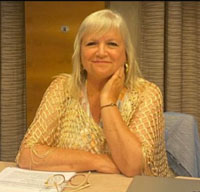
Laura Molet Estaper, Psy.D
Barcelona, Spain
Email Laura Molet
Laura Molet Estaper
Barcelona, Spain
El sentimiento de pertenencia y el hogar terapéutico han sido dos grandes e inspiradores temas de las Jornadas organizadas por IARPP en Mérida.
La primera plenaria fue leída y comentada en español. hecho que sucedía por primera vez en unas Jornadas internacionales de IARPP, y tuvo muy buena acogida: El Hogar maya espiritualidad, cultura, identidad y cosmovisión; nos dieron una perspectiva inédita del viento y los 4 puntos cardinales. Ella Fany, Nancy Walker e Indalencio Cardeña (todos de Mexico) nos transmitieron una bocanada de aire fresco cargado de energía, sabiduría y buenas vibraciones. Por cierto, el tema del lenguaje (inglés o español) también se debatió en el panel de Silvia Saraceno (Argentina) y Steven Knoblauch (EU): Si estoy en mi Hogar, ¿porque hablar en un idioma que no es el nuestro? ¿Por qué cada uno no puede preparar su paper en su propio idioma?
Las participaciones de las organizadoras fueron excelentes: Adriana Cuenca (EU y Mexico) nos planteó la cuestión esencial del hogar como paradoja y cómo el sentimiento de pertenencia y aceptación social influyen en la salud mental.Existe una narrativa de opresión transmitida intergeneracionalmente a través de las culturas. Focalizó su mirada en el sentimiento de vergüenza (uno de mis principales centros de interés) y destacó que es una cicatriz invisible que dificulta la construcción de una personalidad fuerte. Berta Loret de Mola (Mexico) nos deleitó con unos casos clínicos donde se planteó la idea de hogar como designio maldito. El hogar que habitamos proyecta la sombra de nuestros ancestros. Las leyendas son sueños colectivos, como la leyenda de Ixtabai.
Peggy Crastnopol (EU) empezó su plenaria invitándonos a pensar cuestiones muy interesantes en torno al tema que nos convocó:
“Se podría pensar que el sentido de hogar de una persona se basa en tres registros diferentes que se superponen y se entrelazan entre sí. Está el hogar como la presencia material, física, con la que tenemos una relación pragmática; el hogar como una presencia metafórica y simbólica que se expresa psíquica e interpsíquicamente; y finalmente, algo más nebuloso, el hogar como una presencia emocional, llena de estado de ánimo, que ofrece un tipo específico de atmósfera afectiva y actitudinal.”
Los humanos necesitamos pertenecer, pero a veces las coordenadas de pertenencia pueden desestabilizarse. ¿A quién y dónde pertenecemos? Nos preguntó Eyal Rozmarin (EU) en su panel sobre reconocimiento mutuo y sentimiento de pertenencia en tiempos de guerra. En momentos de crisis está en juego saber quién eres, quién es tu gente y el miedo de ser un traidor”.
La identidad personal la podemos concebir como una estructura subjetiva, compleja y dinámica influida por los contextos vitales.
Para poder existir psíquicamente es imprescindible haber sido visto/a desde la 1a infancia y habitar la mente de nuestros cuidadores principales, tal y como recalcó Jessica Mezquita (Mexico). En este sentido, en el panel que compartí con Ruth Lijtmaer (EU) y Andrea Lerner (Peru), presenté un paper titulado “Home sweet home…but is it always so sweet?” en el que cuestionaba esta frase típica y tópica porque muchas veces los contextos de desarrollo han sido difíciles, negligentes y/o traumáticos, y no siempre el sabor del hogar es dulce, sino que a menudo puede ser amargo, picante, agrio… texturas y sabores que no aportan seguridad ni disponibilidad parental, razón por la cual muchas personas no han podido construir una identidad consistente y coherente ni tampoco han podido habitar en la mente de sus figuras de referencia.
La mente sin hogar se experimenta como una muerte psíquica, una experiencia devastadora. No ser reconocido ni visto por los padres crea un sentido de vacío sobre sí mismo y falta de vitalidad.Sabemos que lo que cura es la relación, el vínculo terapéutico, definido como una relación sana y viva que da cabida al crecimiento y al cambio a lo largo del tiempo.
En los espacios terapéuticos es muy importante que l@s pacientes encuentren hogar en la mente de las terapeutas. Y nosotros, por nuestra parte, deberíamos estar en condiciones de aceptar esta invitación (Anthony Bass, EU). Co-creando, así, un Hogar Terapéutico y Relacional que acoge el dolor, que lo puede sostener, que aporta seguridad, donde se inicia un proceso de resintonización y de nueva coherencia y de conexión emocional.

Laura Molet, Psy.D
Barcelona, Spain
Email Laura Molet
Belonging Across the Screen
Shir Shanun, Psy.D.
Arcadia, California, USA
In a recent paper about the origin of shame in early life, Daniel Goldin and Daniel Posner describe participatory belonging, a process of joined immersion in imagination as we expand our stories together, which creates what they call “an experience about experience.” I imagine this is what the IARRP Conference in Merida set out to accomplish as it brought together anthropology, sociology, and psychoanalytic perspectives around the theme of belonging and home, while bringing forward experiences of immigration, marginalization, indigenous culture, and the socio-political.
As a Zoom participant, my experience of un-belonging was a felt presence. Despite the staff’s genuine effort to resolve technical challenges, the audio and translation repeatedly created an experience of disconnection. In this disconnection experience, immigration, being an “absent presence,” and the liminal experiences outside culture came alive. I was immersed in the atmosphere of foreignness, an experience that slowly transformed as connection was restored in sound or image, and when meaningful words or visual symbolization evoked by a speaker struck a chord at heart. My experience of searching for connection over the distance of technology and physical space evoked an appreciation of the opening papers which emphasized indigenous connections with the land, with rituals, with legends, and with the people. Perhaps that is the greatest part of attending a conference in person – our human relatedness, the very thing missing in the Zoom experience.
This process of disorganization, disconnection, then back to connection was repeating throughout the conference. Allowing myself to experience it as a field experience, in the ways both Goldin and Giuseppe Civitarese describe, brought the disconnected experience into the story of the conference. How do we belong to one another while we don’t share the same immediate experience? The struggle was for it not to narrow the range of emotional connection, as Civitarese would impart. At other times the Zoom experience was on the saturated side, with one clinical example following another clinical example following another, where the feeling was of a needed break to dis-embed. Again the field perspective brings into view the struggle of belonging, where at times, as Eyal Rozmarin suggests, we need to un-belong in order to restore our connection.
I started this reflection with Goldin and Posner’s paper on shame as I found the plenary discussing shame, Belonging and Alienation in the World – and in the Therapy, to be especially connecting. Micha Weiss’ (Israel) exploration of a relational home brought me in, as he shared a clinical struggle he described as a socio-political collision which widened the relational scope of his work. I enjoyed Peter Shabad’s (USA) exploration of belonging in the world as a function of our love and desire being received with hospitality, in contrast to rejection which leads to self-shame. I appreciated Peter’s insight on how power and loyalty generate a false sense of belonging. I resonated with his inspiring hope and sensibility as a humane therapist who welcomes the person’s desire and creates an emotional home. I take with me his statement about the relational home as “a bridge to the other.”
While there were other moments of connection across different plenaries, it was this one that created a felt bridge to my experience and provided a relational home. Returning to Goldin and Posner, it bridged the gap – the story of the plenary was one I could join in my imagination, and in the experience of joining (undisturbed by technical limitations of connection), this plenary created in me a felt sense of belonging.
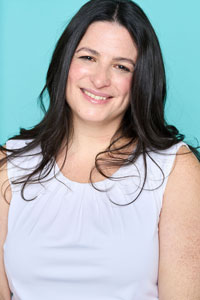
Shir Shanun, Psy. D.
Acadia, California, USA
Email Shir Shanun
Minh Truong-George
Aukland, New Zealand
This was my first IARPP conference. The theme of Home and Belonging drew me to Mérida, where four days of true and deep connections filled me with hope, healing, inspiration and enthusiasm for the next one. I am relieved and enlivened by the visibility of our humanness – our vulnerability, frailty and potential to relate and care, despite human conflict and the pain caused by not knowing. Here, I share two examples of co-created therapeutic ‘home’ I experienced with other conference participants.
The first started with my request for a vegetarian meal for the tour. I was told that my request had been noted but there were no guarantees, and it might be best to bring my own food because food seemed important to me. It was strange having to explain how it was not ‘food’ per se that was important to me, but what food symbolizes and mobilizes in us all at so many different levels: the experience of being welcomed and nourished at the physical, emotional, and spiritual levels; the possibility of being valued and enjoyed sitting together at the same table; the potentiality of deep sharing of hearts and minds during meal times which enables us to “take in” the other …
As I reflect, I wonder whether we make enough space in the psychoanalytic frame for food, and all that food entails. If we lose feelings of reverence in connection to food and we forget the joy (and the privilege) of appreciating the taste, smell, texture, and sustenance that food symbolizes, how will we welcome “food” to the therapeutic table when it is ‘dished up’? How welcoming will we be, to take in and digest our clients’ gastronomical delights, both real and imagined, when food enters the room?
Yet there was a very happy ending to this food dilemma! With perseverance, the miscommunication was cleared, and I enjoyed a relaxed and welcoming meal during the tour, where I met a wonderful group of warm, welcoming, engaging women who shared the joy of eating together and the pleasure of taking each other in throughout the conference (and beyond!).
The second example occurred during the large process group where I took the risk of speaking up about my experience of invisibility in the group. I also spoke about the aching of my heart as it experienced the hurt caused between individuals during an intense process around gender, and my appeal to the group to find a way to be in conflict without killing one another off. Rather than being told to shut up or be thrown overboard (as was my young refugee child’s experience and the title of my paper), by speaking up about my aching heart and its needs, others began sharing what lay in theirs. I felt the group shift from the energy of angry retaliation to a deeper listening to each other’s pain.
I want to conclude by naming how moved I was during the panel of Belonging in Wartime, papers presented by Nissim Avissar (Israel), Eyal Rozmarin (USA), and moderated by Victor Donas (Chile). The room was overfilled with people, and rather than sitting where they were placed, these three speakers came forward from behind the table and joined their audience. Their repositioning spoke volumes about their work and where they stood in response to the suffering in Gaza. At the end of the presentation, Nissim said something like, “I know how pessimistic it all sounds but that is all that I alone can do…”. His admission evoked (to my surprise) such strong objection from me. I asked out loud, how he could say it was pessimistic when he was willing to feel his pain – it was the most optimistic thing I have heard in a while! Surely it is only when we can feel how it hurts, that we would want to cease causing pain?
As a result of the conference, I feel optimistic about the possibility of peace despite the apparent strife in the world. I feel hope when I see individuals taking tender care of our aching hearts and seeking safe places where we can cry and let our pain be known, rather than numbing our hearts and willfully inflicting pain on the ‘enemy’ out there.
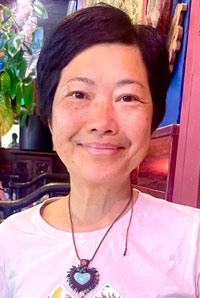
Minh Truong-George, BA, Diploma in Psychosynthesis Psychotherapy, Registered Psychotherapist
Auckland, New Zealand
Email Minh Truong-George


